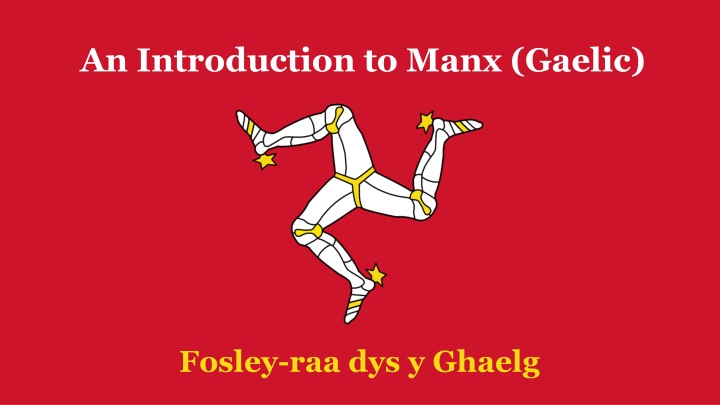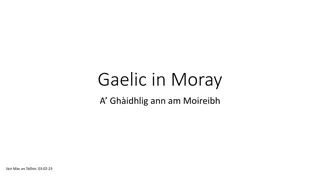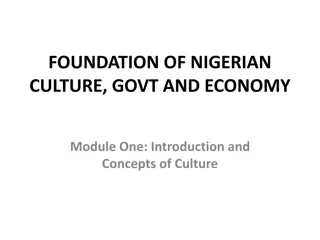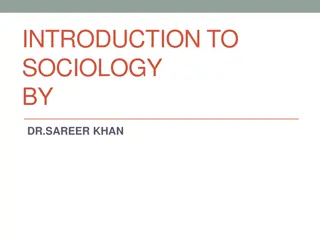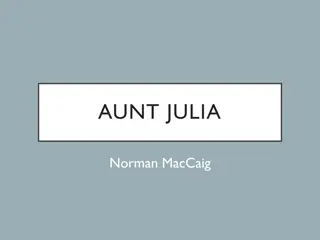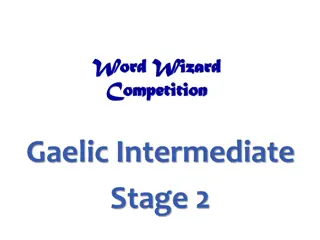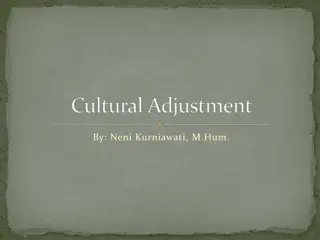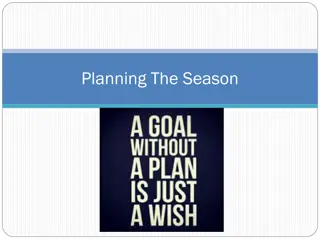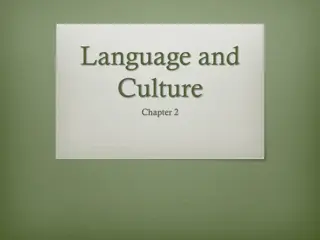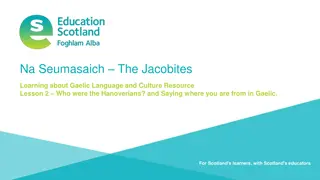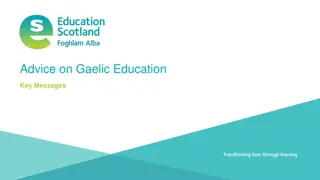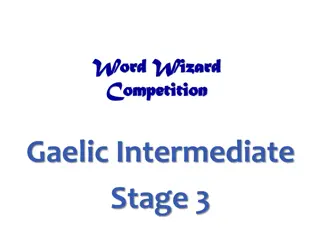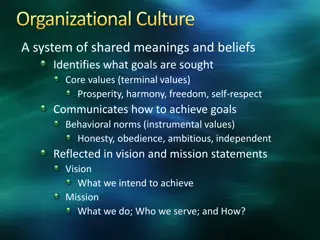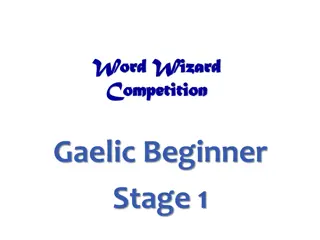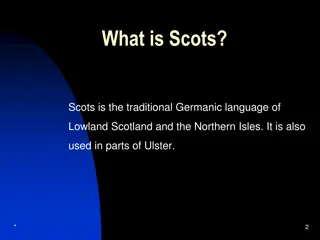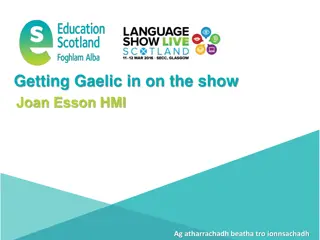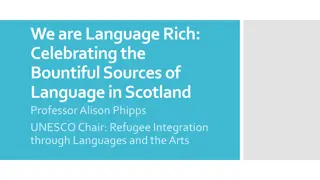Discover Manx Gaelic: An Introduction to the Language, History, and Culture
Manx Gaelic, also known as Gaelg or Gailck, is a Goidelic language spoken on the Isle of Man. Descended from Old Irish, it has similarities with Scottish Gaelic and Irish. The language faced decline but experienced revival efforts. Explore the rich history, last native speakers, and unique proverbs of Manx Gaelic.
Download Presentation

Please find below an Image/Link to download the presentation.
The content on the website is provided AS IS for your information and personal use only. It may not be sold, licensed, or shared on other websites without obtaining consent from the author.If you encounter any issues during the download, it is possible that the publisher has removed the file from their server.
You are allowed to download the files provided on this website for personal or commercial use, subject to the condition that they are used lawfully. All files are the property of their respective owners.
The content on the website is provided AS IS for your information and personal use only. It may not be sold, licensed, or shared on other websites without obtaining consent from the author.
E N D
Presentation Transcript
An Introduction to Manx (Gaelic) Fosley-raa dys y Ghaelg
What is Manx? Native name: Gaelg / Gailck [gilk/gilg]; / y Gaelg [ lk] Language family: Indo-European, Celtic, Insular, Goidelic Descended from Old Irish Similar to Scottish Gaelic and Irish (Gaelic) Influenced by Old Norse and English
Where is it spoken? The Isle of Man / Ellan Vannin - a self-governing Crown dependency in the Irish Sea between Great Britain and Ireland.
A brief history of Manx 5th Century AD Old Irish brought to Isle of Man Manx started to emerge as distinct language by the 13th century Language declined from the early 19th century Revival efforts from the late 19th century Disappeared as a community language in the early 20th century Manx taught in schools from 1980s. Bunscoill Ghaelgagh opened in 2001 1,823 speakers of Manx (2011 census)
Comparison with other Gaelic languages Manx Hie mee dys yn thie lhionney / thie oast riyr Ren mee goll dys yn thie lhionney riyr Scottish Gaelic Chaidh mi dhan taigh-seinnse / taigh- sta a-r ir. Irish Chuaigh m go dt an teach t bhairne ar ir. Translation: I went to the pub last night
Last Native Speakers Edward Ned Maddrell (1877-1974) was officially the last native speaker of Manx. Other native Manx speakers survived into the 1980s, but were too ashamed to admit that they spoke Manx.
Manx proverbs and sayings heer gyn hengey, heer gyn ennym. A country without language is a country without an name/identity. Gyn hengey, gyn heer No language, no country Tra haink ny skibbyltee boghtey stiagh hie yn Ghaelg magh. When the tourists came in, the Manx language went out. Cha jean oo rieau cosney ping assjee. You'll never earn a penny from it.
Bannaghtyn / Greetings Moghrey mie = Good morning Fastyr mie = Good afternoon / evening Oie vie = Good night Slane lhiat (sg) / Slane lhiu (pl) = Goodbye Hee m oo (sg) Hee m shiu (pl) = See you
Bannaghtyn / Greetings Kys t ou (whooniney)? = How are you (mate)? (sg) Kanys ta shiu? = How are you? (pl) Braew, gura mie ayd, as uss hene? = Fine, thanks, and you? Mie dy liooar = Well enough Castreycair = Middling Goll as gaccan = Going and grumbling
Getting to know people Cre n ennym t ort? = What s your name? Ta n ennym orrym ...? My name is ... Mish ... / She ... mish = I m ... Quoi uss? Who are you? Quoi shoh / shen? = Who is this / that? Shoh / shen ... = This/that is ...
Getting to know people Cre voish t ou? = Where are you from? Ta mee voish ... I m from ... C raad t ou cummal? = Where do you live? Ta mee cummal ayns ... = I live in .... Cre t ou jannoo? = What do you do? Mish yl- hengagh / studeyr / shellaneyr = I m a polyglot / student / bee-keeper
Language difficulties Vel Gaelg / Baarl ayd? = Do you speak Manx / English? Ta, beggan = Yes, a little / Ta mee gynsaghey = I m learning Vel oo toiggal? = Do you understand? Ta mee toiggal / Cha nel mee toiggal = I do / don t understand Loayr ny smelley, my sailt = Please speak more slowly Screeu shen sheese, my sailt = Please write it down Cre ta n fockle son ... sy Ghaelg? = What s the Manx word for ...?
Being and doing Positive Negative Dependent Pronouns Ta (present) Va (past) Bee (future) Veagh (conditional) Cha nel Cha row Cha bee Cha beagh Vel Row Bee Beagh Mee (mish) = I Oo (uss) = You (sg) Eh (eshyn) = He Ee (ish) = She Shin (shinyn) = We Shiu (shiuish) = You (pl) Ad (adsyn) = They Ren (past) Nee (future) Cha ren Cha jean Ren Jean Examples Vel oo goll dys y thie oast noght? = Are you going to the pub tonight? Ta = Yes / Cha nel = No Ren oo goll dys y thie jalloo riyr? = Did you go to the cinema last night? Ren = Yes / Cha ren = No Jagh oo = Did you go? Hie = I went, Cha jagh = I didn t go Jed eh = Will he go? Hed = He ll go, Cha jed = He won t go
Ceaghlaghyn / Mutations Examples Ben = woman - Yn ven = the woman Oie = night - Oie vie = Good night Juan = John - Gleashtan Yuan = John s car Kirree (name) Shamyr Chirree = Kirree s room Jesh = nice Feer yesh = Very nice Braar = brother Un fraar = One brother Shuyr = sister Daa huyr = Two sisters Moghrey = morning Sy voghrey = In the morning Jishag = daddy Dty yishag = your daddy
Kiangley / Links Omniglot Manx pages http://www.omniglot.com/writing/manx.htm Learn Manx / Ynsee Gaelg http://www.learnmanx.com Apps for learning Manx language, history and songs http://www.culturevannin.im/cms/page_288619.html Manx-English dictionary http://www.mannin.info/Mannin/fockleyr/e2m.php Manx-English translator http://taggloo.im/Translate Manx Radio s News in Manx http://www.manxradio.com/news/manx-gaelic/ Eiraght Ashoonagh Vannin / Manx Heritage Foundation http://www.manxnationalheritage.im
Gura mie eu Thank you
